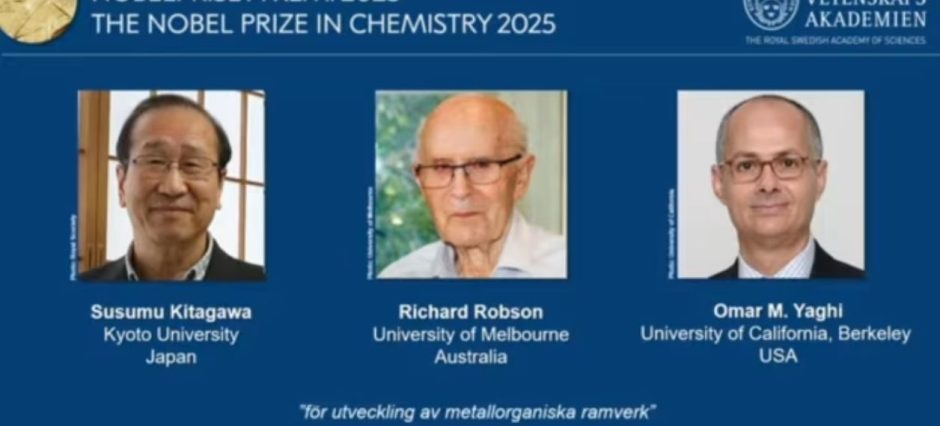The 2025 Nobel Prize in Chemistry has been awarded to scientists Susumu Kitagawa, Richard Robson, and Omar Yaghi for their groundbreaking development of metal–organic frameworks (MOFs). The Royal Swedish Academy of Sciences announced the decision on Wednesday, recognizing their work as a major contribution to modern chemistry and materials science.
Metal–organic frameworks, often referred to as MOFs, are advanced materials built from metal ions and organic linkers. These structures are known for their highly porous nature, which allows them to absorb, store, and filter gases with remarkable efficiency. Their development has opened up new possibilities in clean energy, environmental protection, and medical research.
The Nobel Committee highlighted that the discovery and refinement of MOFs have transformed scientific research and practical applications alike. By combining chemistry with innovation, Kitagawa, Robson, and Yaghi created a new class of materials that could help address some of the world’s most pressing challenges, including clean energy storage, water purification, and carbon capture.
The Nobel Prize, awarded for more than a century, is considered one of the most prestigious honors in science. This year’s laureates will share the prize money of 11 million Swedish crowns (approximately $1.2 million). Beyond the financial award, the recognition places their names alongside past Nobel legends who shaped modern science.
Professor Omar Yaghi, known for pioneering work on reticular chemistry, was one of the first to demonstrate how MOFs could be used to store gases like hydrogen and methane. Susumu Kitagawa and Richard Robson also played key roles in designing frameworks that improved the efficiency and versatility of these materials. Together, their collective work built the foundation for an entirely new scientific field.
Experts believe that the applications of MOFs will continue to expand in the coming years. From designing eco-friendly fuels to developing advanced drug delivery systems, these materials have the potential to revolutionize multiple industries. The Nobel Committee praised the trio not only for their scientific vision but also for their long-term impact on global research.
This recognition comes at a time when the scientific world is increasingly focused on sustainable solutions. It also reflects the growing public interest in scientific achievements, much like global attention to unusual events in aviation such as the Qatar Airways passenger incident, which raised awareness about health and safety in everyday life.
The Nobel Prizes in Physics, Medicine, and Literature will also be announced throughout the week, with the Peace Prize drawing worldwide attention as one of the most followed awards.











